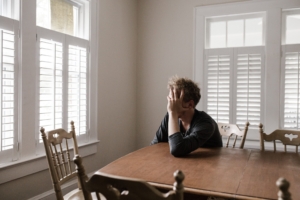The feeling of being yanked from a deep sleep, heart beating fast, feeling nauseous and almost failing to breathe. This is a result of a series of thoughts one is unable to shake. This is one of many symptoms of what is called existential anxiety.
The series of thoughts that are hard to get rid of have to do with the perceived meaninglessness of life. This is when someone is confronted with the reality of the fragility of life and feels overwhelmed by anxiety. For those seeking support, San Diego Christian Counseling can provide valuable guidance in navigating these feelings.
Anxiety is how our body reacts to stressful stimuli. Existential anxiety is brought about by the dreadful realization of how fragile life is and how easily it can soon vanish. Coming to terms with the inevitability of death creates a state of anguish and despair.
Four main concepts of existential anxiety
 To understand existential anxiety, it is important to know that it is often discussed through the lenses of four main concepts. People will experience existential anxiety in different ways, but the concepts below are common expressions of it. They might experience all of them or just one, it all depends on what triggers their anxiety in this way.
To understand existential anxiety, it is important to know that it is often discussed through the lenses of four main concepts. People will experience existential anxiety in different ways, but the concepts below are common expressions of it. They might experience all of them or just one, it all depends on what triggers their anxiety in this way.
Death and illness
The fragility of life is usually one of the major triggers for one to develop existential anxiety. When one comes face to face with their mortality it can create feelings of dread. This is mainly because they can become anxious about what happens to them after death, or what would happen to their loved ones and dependents.
If they are Christians, they might be concerned about either going to Heaven or Hell and whether they have lived a life that is worthy of the Lord. They might constantly worry about the financial future of their dependents if they feel like they haven’t prepared enough for their family to survive without them.
The fact that one’s life is going to end can lead others to question the way they have been living up until now, whether it is too late to make changes, or if there is no point in trying since they are going to die anyway. With death comes the question of how one is going to die. That in itself can cause anxiety about illnesses, catastrophic events, accidents, or anything that can be viewed as a threat to someone’s life.
Responsibility and fear
All through life, we are taught that we are responsible for our choices. However, with this freedom to choose comes the responsibility of living with the choices we have made. Existential anxiety develops in this instance as a fear of making life choices that will be detrimental in the future. The fact that the world offers us so many choices further increases this anxiety.
Take, for example, the choice of a spouse. When in the old days, people used to marry those they were in proximity with, it made those choices a lot easier. Our fast-paced world of technology has, however, broadened the pool of suitors, and with online dating, it can be anyone from any part of the world. That’s staggering and can be anxiety-inducing.
Authentic living
 A huge part of existential anxiety comes because of one asking themselves if they are truly living their true authentic self. The world we are raised in has several rules, norms, and cultural expectations that often hinder people from living according to their preferences. The constant tugging between what one needs to do and what one wants to be can become a great source of anxiety.
A huge part of existential anxiety comes because of one asking themselves if they are truly living their true authentic self. The world we are raised in has several rules, norms, and cultural expectations that often hinder people from living according to their preferences. The constant tugging between what one needs to do and what one wants to be can become a great source of anxiety.
Sometimes, those who choose to live their true authentic selves suffer discrimination and isolation. This can be a child who decides they do not want to work in the family business but instead chooses to pursue a career in the arts or any other field. The backlash from family or perceived future backlash for making such a decision creates this angst within a person who feels they are failing to live to their full potential.
Meaninglessness of life
What is the point of living? This is the question that someone experiencing existential anxiety might ask themselves repeatedly. This can sometimes be the result of concluding that if all we are here for is to wake up, go to work, and live through life without reaching our goals or fullest potential, then what is the point?
This comes from melancholy and having nothing to aspire to or be excited about. If all we are going to do is die, why then go through this whole process that is seemingly meaningless?
Sometimes the meaninglessness of life comes because of a loved one who worked hard, lived life to the full, and did everything by the book to be a good person and provide for their loved ones suddenly dying or being diagnosed with a life-threatening illness. The hopelessness that comes from witnessing the fact that even “good” people are not spared from the harsh realities of life.
What causes existential anxiety?
 Existential anxiety can be triggered by many different life events. These events typically come to disrupt the status quo and make someone question their existence and life in general. Though not an exhaustive list, below are some life experiences that can cause someone to develop existential anxiety:
Existential anxiety can be triggered by many different life events. These events typically come to disrupt the status quo and make someone question their existence and life in general. Though not an exhaustive list, below are some life experiences that can cause someone to develop existential anxiety:
- Reaching a milestone age e.g. 18, 40, 50
- The death of a loved one or someone close in age.
- Catastrophic events that leave us feeling powerless like terrorist attacks, school shootings, natural disasters, or the more recent COVID-19 pandemic.
- Diagnosis of a terminal illness, either your diagnosis or that of someone close to you.
- Loss of identity due to changing circumstances like relocating to another country.
- Changing religion.
- Significant life changes like having a baby, marriage, divorce, job loss, or promotion.
Symptoms of existential anxiety
- An unhealthy preoccupation with thoughts of death and dying.
- Excessive worry and fear about the future.
- Intense guilt about past mistakes.
- Lack of motivation for work, hobbies, family, or community.
- Depression and or anxiety.
- Inability to make future decisions.
- Feeling stuck and unable to plan for the future.
- Constantly questioning the meaning of life, and in extreme cases, suicidal thoughts.
- Physical symptoms of anxiety like panic attacks, tightening of the chest, rapid heart rate, inability to breathe properly, sweating, and nausea.
Final thoughts
It is normal for all of us to experience moments of worry about the future and death. It does not mean that anything is wrong. Where this differs from existential anxiety is when this worry and angst interfere with a person’s ability to function normally.
It is also important to note that those who struggle with existential anxiety can take this situation and make it into a growth opportunity. Though difficult to deal with, if one examines it with good guidance, one can find ways in which to grow as a person.
Existential anxiety almost forces people to have conversations with themselves that they might have been avoiding. Once this has been achieved, they can use that self-awareness to work on developing themselves, their thinking, and how they approach the world.
 Reach out for support
Reach out for support
Experiencing existential anxiety can be overwhelming and it’s hard to know how to cope. If you or your loved one is experiencing existential anxiety and in need of answers, support, and guidance, please reach out to our offices.
We will connect you to Counsellors and Therapists who are waiting to hear from you. They will provide you with a safe and confidential space to help you process what you might be experiencing and equip you with the necessary tools to cope. With options like San Diego Christian Counseling, you can find support tailored to your needs.
“Under the Sun”, Courtesy of Pixabay, Pexels.com, CC0 License; “The Birds”, Courtesy of Nur Demirbaş, Pexels.com, CC0 License; “Dejected”, Courtesy of Andrew Neel, Pexels.com, CC0 License; “Friends”, Courtesy of Mental Health America (MHA), Pexels.com, CC0 License“Under the Sun”, Courtesy of Pixabay, Pexels.com, CC0 License; “The Birds”, Courtesy of Nur Demirbaş, Pexels.com, CC0 License; “Dejected”, Courtesy of Andrew Neel, Pexels.com, CC0 License; “Friends”, Courtesy of Mental Health America (MHA), Pexels.com, CC0 License


